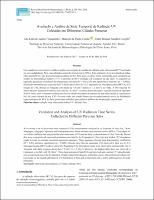Validation and analysis of UV radiation time series collected in different peruvian sites
Metadata
Show full item recordDate
2018-06Collections
- Artículo científico [171]
Abstract
We evaluate a set of ultraviolet solar radiation (UVR) measurements collected in six locations in Peru: Ica, Tacna, Moquegua, Arequipa, Cajamarca and Marcapomacocha, whose altitudes vary from sea level to 4479 m. The analysis involved the validation and analysis of the ultraviolet index (UVI) and the daily erythemal doses (D-Er). Clear-sky filtered data were compared with numerical simulations provided by the Tropospheric Ultraviolet and Visible (TUV) radiation model in order to estimate numerical regression equations. These equations showed high determination coefficients (R 2 > 0.91) statistical significance (p < 0.0001). Results show that the maximum UVI observed in Peru was 23.5 in Marcapomacocha (4479 m above sea level). Regarding D-Er, the highest means were observed in summer at the city of Arequipa with daily averages closer than 7.9 kJm -2 (± 1.3 kJm -2 ). However, the highest daily dose was observed in Cajamarca in the fall, with 14.3 kJm -2 . These large amounts of high D-Er and very high and extreme UVI episodes indicate an important risk to the development of solar-related skin diseases, as the skin cancers. Our analysis provides a new knowledge on the spatial and temporal UV distribution in Peru and an important tool to justify public policies for solar protection.
The following license files are associated with this item:








